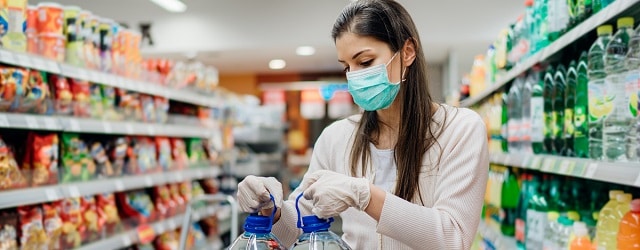Covid-19, quarantines, and lockdowns are creating winners and losers in the marketplace.

From shortages driven by hoarding to aircraft grounding, industries are dealing with broad disruptions caused by extended lockdowns amid the coronavirus pandemic.
Airlines, producers of discretionary goods, and foodservice are being hit hardest by global travel restrictions while “necessary” industries such as food, healthcare and homecare face demand shocks and workforce fatigue as they ramp up production.
Unprecedented restrictions taken by many countries to fight the spread of the Covid-19 virus have pushed the global economy into a recession this year as bad or worse than 2009, according to the International Monetary Fund.
As China gradually emerges from the emergency, industry sources and analysts say they expect consumers behavior to change amid prolonged health concerns, potentially slowing down the pace of the recovery expected to start in the second half of the year.
“We are having conversations internally on how people’s shopping behavior will change. I think it is going to depend on how long it lasts,” says Doug Baker, Vice President, industry relations, at FMI, the US food industry association. One trend they are assessing is the rise of e-commerce over brick and mortar retail, he says.
Company executives face starkly different challenges depending on the industry they are in and the severity of social distancing and self-quarantine measures in their country.
Toilet paper and hand sanitizers sold out quickly as “stay at home” measures were implemented first in China, followed by Europe and the United States. Sales of hand sanitizers, medical masks, thermometers and aerosol disinfectants jumped as much as 319% in US stores in the four weeks ended February 22 compared to the same period the year before, according to Nielsen. In Malaysia, sales of hand sanitizers jumped more than 800% above the weekly average in the same period, Nielsen said.
Supply Chain Challenge
Ensuring regular delivery and restocking has become a primary challenge as consumers stockpile basic goods. “Manufacturers and retailers are working very closely to identify ways to create efficiencies in manufacturing and supply chain,” FMI’s Baker says.
Manufacturers of “necessary” consumer goods are facing higher labor costs between salary incentives and additional hiring as they ramp up production amid health safety concerns.
Food multinational Mondelez International said it increased pay for its US frontline workers by $2 per hour through May 2 and will give affected employees additional weeks of 100% paid leave. Restaurant Brands International (Burger King, Popeyes) said they will pay sick leave at company-owned eateries.
“In this time of heightened need, we are working in close collaboration with customers and local communities to ensure that production lines remain operational, distribution networks continue to work efficiently, and U.S. consumers have access to foods on shelves,” says Glen Walter, EVP and President, North America at Mondelez International.
In retail, e-commerce giant Amazon, and app-based delivery services such as Instacart, are hiring thousands of temporary workers to ensure smoother delivery and workforce safety.
In brick and mortar, chains such as Macy’s and Sephora have furloughed much of their workforces as cash dries up.
Liquidity Crash
The global airline industry, in its deepest crisis ever according to International Air Transport Association (IATA), needs government bailouts and emergency funding to stay afloat. Most airlines have less than three months of liquidity and will run out of cash before the recovery begins, IATA says.
“We expect the airlines to continue to fly minimal schedules, canceling as much as half their scheduled flights every day until April, when most already announced cancelations as great as 90%,” says Helane Becker from Cowen & Co.
Assuming a three-month lockdown of global air travel followed by a gradual recovery in demand, IATA forecasts a passenger revenue loss of $252 billion this year compared to 2019 and industry capacity to fall by 38% in 2020.
The travel and tourism industry faces a GDP loss of up to $2.1 trillion in 2020, according to the World Travel and Tourism Council (WTTC). A total of 75 million jobs are at risk, it says.
Manufacturers Retoool Operations
In a war-like manufacturing scenario, “discretionary” goods makers have converted factory lines to make medical equipment amid a global shortage.
Consumer goods conglomerate P&G said it will provide a minimum of 10,000 liters of hand sanitizers in 16 countries around Europe. Luxury giants LVMH, Kering, Armani, Hermes and others are either making gowns and masks or funding manufacturing and first responders. Brooks Brothers announced it will start producing up to 150,000 surgical masks per day at its US factories and soon make protective gowns.
The automotive industry is responding too. Under a presidential order, carmakers GM and Ford (with GE Healthcare) are making ventilators and Japan’s Toyota will help make ventilators and respirators.



